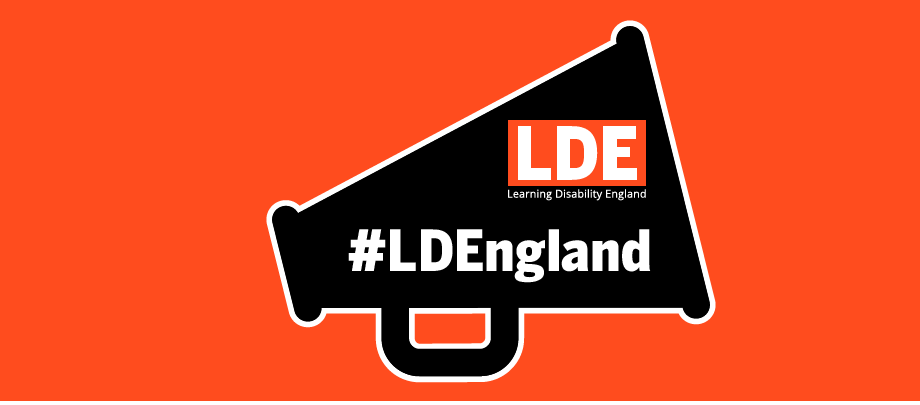Here's Gary's speech from the day.
Gary with LDE lifetime member Simon.
Hi everyone,
I’m Gary Bourlet, Co-Founder of Learning Disability England and I’ve been a self-advocate for over 30 years.
I want to talk to you about Winterbourne View.
What we saw happening at Winterbourne View hospital was terrible – people with learning disabilities were being abused.
When we watched the Panorama programme we all thought two things: 1 - this should never have happened in the first place and 2 – this should never be allowed to happen again.
Winterbourne View was so horrific that the abuse of people with learning disabilities should have stopped immediately. It should have been stamped out forever. But it wasn’t.
Transforming Care was designed to help people with learning disabilities out of places like Winterbourne View and back into the community.
Transforming Care was supposed to give people with learning disabilities something better. It was supposed to create real change.
What we wanted to see were people with learning disabilities being a valued part of their communities. With the opportunity to learn, work and live good, ordinary lives.
We wanted, and still want, to see people with learning disabilities back in the community, being supported to live the lives they want, living independently.
Why? So people can become independent rather than dependant, build confidence and self-esteem in the community by making friends and also contributing to their community.
Living independently doesn’t mean doing everything by yourself, but rather having the support that they want and need.
After the Panorama programme there was Winterbourne View Concordat. The word Concordat was jargon, but it meant that there was a plan.
We thought Transforming Care would give people more freedom, more respect.
But we have not moved on properly. There was a plan and the plan looked great, but progress has been slow.
And actually, all the things we were promised after Winterbourne View are the things that we were already entitled to as human beings with human rights.
In the UN Convention on the Rights of Persons with Disabilities it is very clear that we have a right to a life. We have the right to have the same chances and rights to work as other people, have the best possible health, live in the community. Winterbourne View failed all these points.
The Human Rights Act made our rights very clear too. Again Winterbourne View failed to uphold these basic rights.
It’s clear what should be happening. But it isn’t happening because the government thinks more about value for money than it does about the lives of people like me – the lives of people with learning disabilities.
And the government isn’t even saving money. It’s ridiculous because modern-day institutions like Assessment & Treatment Units cost a lot of money to run.
People with Learning Disabilities and Families are included in Transforming Care and that’s great, but I feel this should have happened long ago.
People with learning disabilities and families are still fighting to see people with learning disabilities get out of hospitals and make sure we do not return to the past.
Still to this day we hear that professionals know best. But professionals haven’t shut down ATUs, they haven’t brought real change.
So - how do we really move forward and make sure we never have another Winterbourne View?
It’s difficult for people with learning disabilities and families to campaign alone and that’s why we need to come together alongside professionals. We are stronger and louder with one voice.
We need to employ people with learning disabilities and their families as quality checkers, to oversee services where they live so that they can advise these services in how they can do things better.
We need more Funding for help in the community like people having access to Learning disability Nurses.
We need to plan beyond people coming out of hospitals to make sure they have a good life once they get out. Even if people do get back into the community, it doesn’t stop there.
We need better benefits with less intrusive and more respectful assessments. We need more focus in supporting people to get Jobs and help with building careers.
We need to support people so that they can have a real social life because, as I always say, loneliness is a killer.
We need action now!
Because although there have been some changes since Winterbourne View, attitudes towards people with learning disabilities are still terrible.
We are still thought of as not important.
Last week was the Autumn Statement and social care wasn’t mentioned once. This was very disappointing.
To really move away from Winterbourne View we need to
change people’s attitudes and come together to fight for the things that
matter.
I will end this speech by encouraging
you all to join Learning Disability England.
Join together with people with
learning disabilities, families and professionals because we are stronger,
louder, together!
Thank you.








